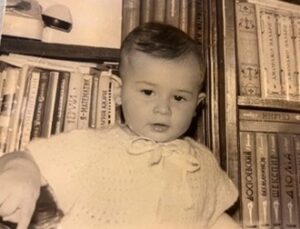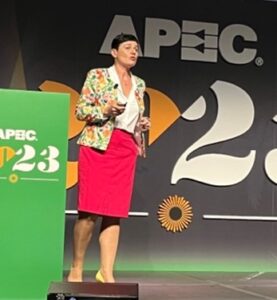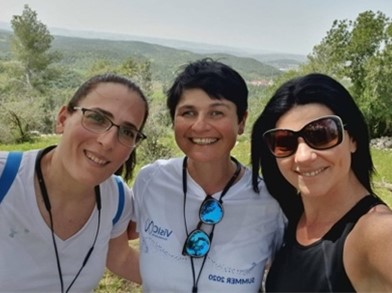 Tamara Baksht
Tamara Baksht
Founder & CEO of VisIC Technologies Ltd.
In this edition of the WLI Entrepreneurial Blog, we present you Tamara Baksht, CEO of VisIC Technologies Ltd. We hope you enjoy learning about her and her journey.
Q. Tell us about your background and why you joined the industry.

I was born and raised in Tomsk, Siberia, former USSR, in a family of political exiles. Opting for a technical career tended to be the default option in the former USSR, for anyone who was educated and of Jewish status. In addition, both of my parents were physics professors, so it felt like a natural path to do my BSc in Physics.
Once I completed my bachelor’s degree, I studied philosophy for three years before returning to complete my MSc in Solid State Physics. I had always planned to leave the USSR, so in 1999 our small family – my husband, my 4-year-old daughter, Sofia, and I left, making a quick stop at a wonderful kibbutz on the shore of Galilee Lake, as we were making our way to the USA. Our time in the kibbutz left me fascinated by the Israeli culture of “doing things”, following a vision, and their ability to work as a team – what I think we call the entrepreneurial spirit of Israel today.
My admiration for the Israeli culture convinced me to stay, as I decided that that was the country, I wanted to be a part of – meaning the country I would agree to my pay taxes to. Since I always preferred the practical, tangible outputs of my doings, and Israel was not famous for the applications of solid-state physics, such as heavy industry, I needed to change career direction.
One very smart lady, Dr. Irene Tsimberov, advised me to go into semiconductors, and so I became a PhD student of the EE faculty, group of Electronic Devices, and in October 2000, I started the GaN HEMT project in Israel’s Aircraft Industry, to earn some money.
The life of a first-generation family of immigrants, in a developed country can be very economically challenging. When my second daughter Anna was born in 2001, I was completing my PhD and working a full-time job as both a device engineer and a project manager, where I successfully gathered a great team and produced a GaN HEMT to everyone’s surprise, including mine.
I believe that the advice I received to join the semiconductor industry was priceless: today, semiconductors define the major routes of wealth and progress – just like silk, silver, coffee, and oil have done throughout history. One could potentially compare software to the trade routes of the past, as it is complementary and essential to progress in the semiconductor industry. I believe that the rise of semiconductors is only starting, and that there remains a number of years of growth in both the semi and software industries.
Q. Tell us about your vision for VisIC Technologies and what led you to start the company?

VisIC was established in 2010, after a couple of futile attempts to create GaN dedicated spin offs from Israel Aircraft Industries. VisIC stands for Power Integration Circuits, (vis means power/might in Latin), and our vision is “Efficient Technology to Empower Life.” Focusing on the power market was natural: I believe that GaN is good for anything related to power; it makes highly efficient conversion systems, benefiting our world which is becoming increasingly more electrically driven. I like high power, the higher the better – probably driven by happy memories from my childhood when I played sitting on 3 story tall capacitors of 50 uF in the laboratory where my mom worked 😉. Today, our main market, which is extremely challenging and fast-growing, is the power train for electric cars.
Q. What excited you about entrepreneurship and what are the most exciting and interesting aspects of your job?
The most exciting aspects are the challenges and the feeling of achievement and accomplishment once these challenges are overcome. It’s like reaching the summit of a particularly complex mountain. The challenges are all-encompassing: technical, financial, operational, and related to finding the right work force. They also change over time – what was required of a CEO of a growing startup with 5 employees is very different to what is required of a CEO of a startup with 50 globally distributed employees working directly with major car-maker companies. And there are so many stages ahead! I have always been afraid of boredom – I always have a book on hand, or a puzzle nearby. Being the CEO of a startup for 13 years is never a boring experience.
Q. Did you imagine that one day you would start a company and be a CEO?
Yes. Just about a week after I arrived at the kibbutz, and heard stories about entrepreneurship for the first time, I thought – why not me one day?
Q. What were/are the challenges of being a female entrepreneur?
I have two points to say on this. The first: being a female in business is a challenge. But so is being too short, or too skinny, or having the wrong accent, skin color, upbringing etc. I do not think it is right to only focus on the gender aspect. Throughout our evolution, the notion that a good leader, i.e. the person who brings food and protects from enemies, is someone who belongs to our “tribe”, and is large, strong, fast, and smart, has been hardwired into our brains. From these qualities, only smart is valid today. Or at least I hope it still is 😉. The challenge of overcoming that first rejection is common not only to females, and not all females face the same challenges. I think it is more important to talk about our natural biases which pave the way to business failures. I should also note that, in my observation, I’ve met strikingly different attitudes towards female executives in different companies.
The second is more specific: yes, it is true that the entrepreneurs, especially those in high tech, are males. With that in mind, overcoming and relating to “old buddy gossips” and successfully networking within these groups is much more complicated for me than for your average male peer. However, I do not think that barriers are the reason why men dominate entrepreneurship. I think that, due to a lack of confidence and self-affirmation, women have much less passion to create their own company.
I had an “Aha!” moment when I saw my child for the first time after giving birth. I knew that no company or product could ever be as perfect as this new person, and with that, my absolute personal achievement was completed. The creation of my company and product was about the company and product, not about my self-validation. Men just don’t experience the feeling of deep satisfaction that comes with childbirth, and therefore look for other ways to prove themselves.
Q. What advice do you have for young women who would like to become entrepreneurs?
Think twice and then once more, about what it is you really want. Check within yourselves to see if you feel confident and happy enough, in this highly uncertain landscape to easily recover after experiencing failures, which are inevitable. If yes – do not listen to anyone, instead believe in yourself, and apply all the best practices you can gather to your life. I am a book person, and the best practical guidance I got was from the sincerest book I’ve read about entrepreneur and CEO life, called “Hard thing about hard things” by Ben Horowitz. In addition, the “Incerto” series by Nassim Nicholas Taleb, and “Thinking, fast and slow” by Daniel Kahneman, which were both essential in understanding what makes the mind of a successful entrepreneur.
Q. What do you think we can do to make the semiconductor industry more attractive and retain women?
Offer flexible hours, and the option to work from home without judgement.
Q. How do you encourage men to become allies in gender equality?
Today, I think most men are happy to be a part of gender equality. The real challenge, which requires efforts from both men and women, is encouraging organizational psychologists to change and improve organizational structure and company culture.
Q. How do you imagine the world will change in the next 10-30 years?
I think that we can expect a new division of the elite – those who have access, understanding and an ability to work with semiconductors and software, and all others.
Q. What advice would you give your younger self?
There are many different ages and stages that defined my younger self. If I could talk to myself back when I started the company, I would repeat the advice I got, years later, from the brilliant entrepreneur Dan Charash: “Do not fret so much about your past mistakes, darling! The past is the past, you cannot fix it. But you can fix the future. Focus on it!”
Q. The most important question of all… outside of your laptop and phone, what’s the most important thing you have with you?

The short answer: the people around me.
The long answer: My family. My children and grandchildren, my dog and two cats, my mom, my husband who not only believed in me but also had the courage to join the company I started in 2010, and finally the team who came to work for our company – all brilliant, hardworking experts who share the challenges and achievements with me on a daily basis.

